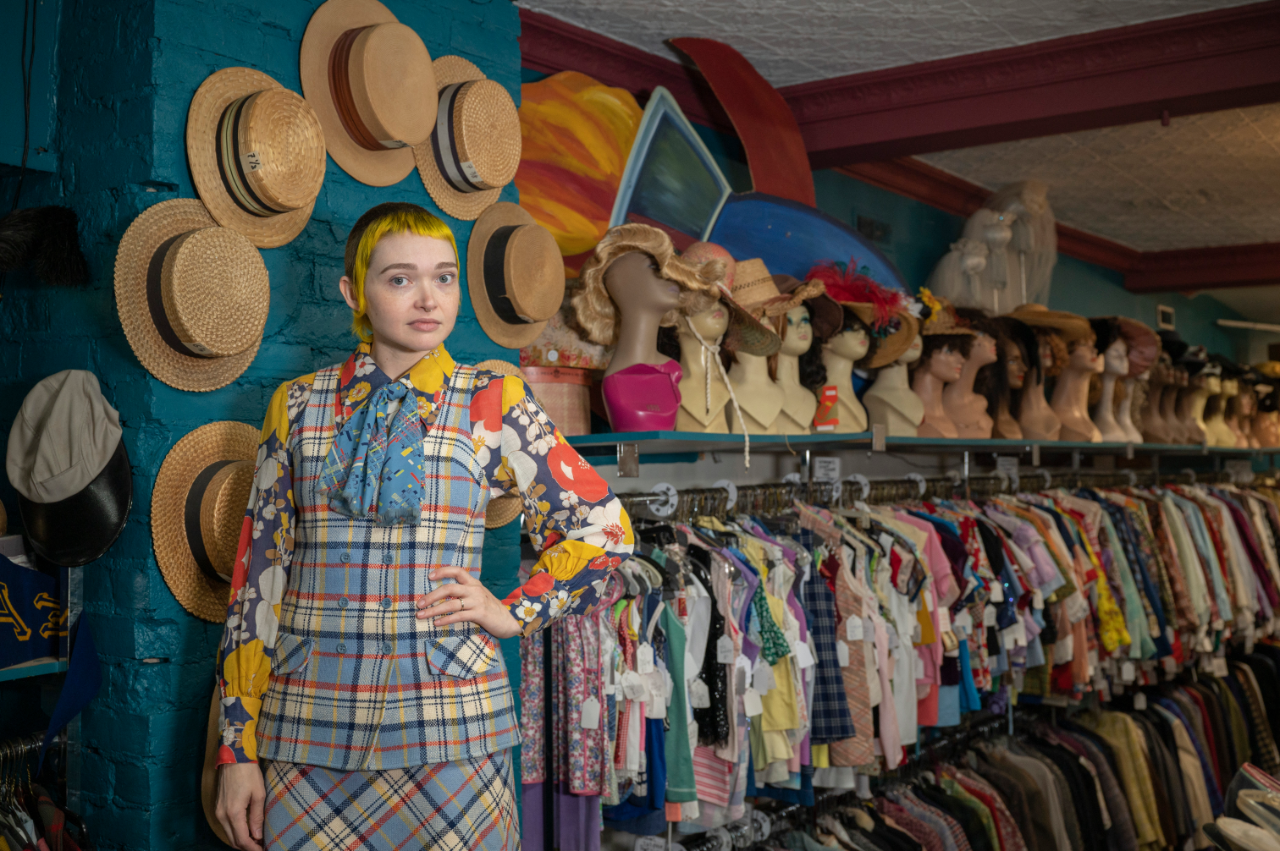
Over the past decade, thrifting has evolved from a growing trend to a full-fledged industry for a generation of sustainability-conscious fashion enthusiasts. However, as the practice of buying secondhand clothes has become increasingly commonplace, the definition of the term “vintage” has grown blurry, often affixed to items from the ‘90s or ‘00s.
When Ashley Beaufille Cook (‘10) purchased Cincinnati’s Casablanca Vintage store in 2013 with their business partner Tim Willig, they aimed to look beyond the trendier, more recent decades that many other vintage shops specialize in to develop their own niche. Take time to browse the racks, and you might find a Monkees bucket hat from the ‘60s, antique Keds boots from the ‘20s or even the occasional piece from the late 19th century.
“We try to carry things that are as old as possible,” Cook says. “It fits with our aesthetics and with what we’re interested in, but it’s also a huge market gap. Most vintage stores aren’t even trying to find stuff older than the ‘70s at this point, so we really make an effort to do that.”
To maintain a diverse inventory, the store brings in clothing from a vast array of sources. While Casablanca’s staff does go on the hunt for items out of town, the majority of their stock comes from visiting customers who have inherited clothes from a family member’s estate or want to sell pieces from their own vintage collection.
"Acquiring new stuff is probably my favorite part of the job. It’s like opening Christmas gifts. You never know what someone’s going to bring through the door."
“Acquiring new stuff is probably my favorite part of the job,” Cook says. “It’s like opening Christmas gifts. You never know what someone’s going to bring through the door.”
The clientele that the Northside storefront attracts can vary just as much as its supply of clothing. According to Cook, typical customers might be vintage enthusiasts who specialize in specific eras like ‘40s and ‘50s fashion, people who do historical reenactments or costumers looking to provide accurate wardrobes for period dramas. Pop stars Kesha and Bruno Mars have even visited the store to shop.
At the same time, Cook is just as happy to point a teenager in the direction of a quirky piece for their closet or help a customer pick out their first dress.
“I love helping people pick out clothes,” they say. “It’s really fulfilling to see someone get excited about an outfit.”
Before they worked at Casablanca, Cook studied theatre/costuming at NKU with a minor in entrepreneurial studies.
“I had to do an internship for my minor, and they wanted us to do something related to a business we would want to start,” they say. “My sneaky way of getting to work at the Cincinnati Art Museum’s Fashion Arts and Textiles department was to say that I might want to own a vintage store one day. It was just an idea I was throwing around, but it actually ended up happening.”
Cook initially enrolled in the Theatre program with the intention of becoming an actor but fell in love with costuming while taking required theatre design courses. They began working at Casablanca part time while doing their museum internship, and were managing the store by the time they graduated in 2010.
Cook expressed interest in becoming a store owner, and Casablanca’s then-owner suggest that they buy the place from him along with Willig.
“That part was actually pretty easy—he was pretty much like ‘I’m done with this,’” Cook says. “But it was really hard to get a business loan as a single female under the age of 25. Nobody wanted to give me one. It was horrible, but that’s what happened.”
After becoming co-owner of Casablanca, Cook began to center the store’s focus on early-to-mid century fashion.
“When Tim and I were just employees here, I had already decided that I was going to go through and pull out everything that wasn’t vintage, which was like half of the store,” they say. “The previous owners were more into stuff from the ‘70s, ‘80s and ‘90s, so they weren’t very good about getting older stuff because they didn’t care much about it.”
Cook also used the opportunity to reorganize the store, particularly the pile of unsorted clothes that had grown in a far corner of the store over the years.
“It was there when I used to shop here in college,” Cook says. “People still come in and say, ‘Last time I was here, there was a huge mountain of clothes over there.’ Now, if I buy something, I process it instantly: It goes to the laundry room and gets washed, sanitized and sorted. I think people are sometimes shocked to see how organized and tidy things have gotten since I bought the store.”
Though Cook may not have considered running a vintage store as a career before taking the aforementioned course in entrepreneurship, their interest in retro fashion dates back to grade school, accompanying their grandmother to thrift stores.
“[She] was really into theatre, and she would pick things up here and there to use for costumes for shows,” says Cook. “I still have the first vintage piece I ever got, from back in fourth grade—a floral hippie poncho. My grandma was like, ‘Are you sure you want this?’ and I said yes. When I wore it to school, people made fun of me, but then two years later, people were wearing, like, mini ponchos from JC Penney."
"I decided I wasn’t going to wear the modern ones. Why give in to the trend when I started it? Ever since then, I’ve been really cognizant of older fashion.”